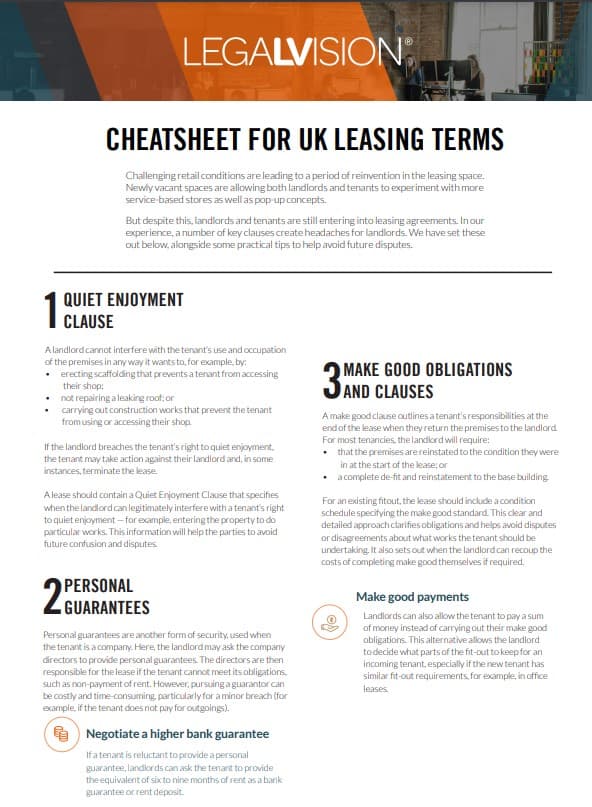Table of Contents
In Short
- Consider the lease term and any security of tenure provisions to understand your rights to stay after the lease ends.
- Review options to end the lease early, such as break clauses or assignment rights, as circumstances may change.
- Clarify repair and maintenance obligations to avoid unexpected costs.
Tips for Businesses
Before signing a lease, ensure you understand your rights, including staying power, exit options and maintenance duties. Clear terms now can prevent costly disputes later and provide flexibility as your business evolves.
As a business owner about to enter a new commercial lease, there are some key considerations you need to think about. A commercial lease is a legally binding contract between you as a commercial tenant and your landlord, the property owner. The last thing you want to do is enter into an agreement that is not suitable for your business. In our previous article, ‘3 Questions a Prospective Commercial Tenant Should Ask Before Signing a Commercial Lease’, we looked at three of the key considerations. This article will consider three essential questions before entering a commercial lease.
How Long Can You Stay?
When entering a commercial lease, you should consider how long you can potentially stay in the business premises. This depends on two factors:
- the lease term; and
- the security of tenure.
The lease term is the length of the lease, and your commercial lease agreement will state the lease term and the lease term end date. Once the lease period is over, you usually have no legal right to remain in occupation of the premises. If you wish to continue staying there, you will need to negotiate a new lease with your landlord.
On the other hand, if your lease has security of tenure, it is a protected lease, meaning that it legally automatically renews on the same terms. This allows you to remain in occupation of the premises after the lease end date unless you or the landlord object to this, which the landlord can only do so on limited legal grounds.
Can You Leave the Premises Early?
When entering into a commercial lease, it is important to consider not only how long you will be able to stay in the property, but also whether you will have the ability to leave before the lease term is up. This is a critical point because circumstances may change, such as:
- your business may grow sooner than you anticipate, so you need larger premises; or
- your business may not do well, and you may struggle to meet rent payments.
To end a commercial lease early, both you and your landlord must mutually agree to surrender the lease. However, the commercial lease agreement may outline other options available to you, such as:
- a break clause that describes that the lease can end before the lease term end date at specific times in the lease and particular conditions; or
- an assignment clause that details any rights to assign the lease to a third party.
Call 0808 196 8584 for urgent assistance.
Otherwise, complete this form and we will contact you within one business day.
Are You Content With the Repair and Maintenance Obligations?
When you sign a commercial lease, you will have to fulfil specific repair and maintenance obligations towards the commercial property. These obligations can vary between leases, but they are generally quite demanding on commercial tenants. Before entering into the lease, it is crucial to understand and agree to the terms of the lease agreement, starting with assessing the state of the commercial premises in terms of its repair.
You are responsible for all repairs and maintenance and must maintain the property in good and substantial condition. You will have to pay for building insurance or your share of it, depending on whether you lease the entire building or only parts of it. If the lease obliges you to carry out complete repairs and maintenance of the building, you will be responsible for the entire building, including the structure. If it is internal repairs and maintenance only, then your landlord will be responsible for any structural repairs.
When you lease only a part of the property, you must maintain and repair only the internal part of the property set out in your lease agreement.

This cheat sheet outlines what you should be aware of in your lease agreement.
Key Takeaways
Prospective tenants like you must take vital considerations before entering a commercial lease. Before signing a legally binding agreement, you should consider how long you can remain in the commercial premises once you enter the lease. Your lease term details this, but you should also consider if the lease has security of tenure. Additionally, you should consider whether you can end the commercial lease before the lease termination date, as factors in commercial lease agreements, such as any break clause, will affect this.
If you need help understanding the key considerations for prospective tenants before entering a commercial lease, our experienced leasing lawyers can assist as part of our LegalVision membership. For a low monthly fee, you will have unlimited access to lawyers to answer your questions and draft and review your documents. Call us today on 0808 196 8584 or visit our membership page.
Frequently Asked Questions
Yes, some leases include a break clause or assignment option, allowing you to end or transfer the lease early under certain conditions. Review these clauses carefully before signing.
Responsibilities vary, but tenants are often required to handle internal repairs, while landlords manage structural maintenance. Always confirm specific obligations in the lease agreement.
We appreciate your feedback – your submission has been successfully received.









